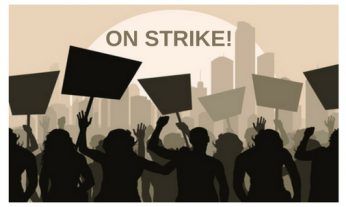 Strike! The rumblings in the workplace are growing. Employees feel dissatisfied on a many fronts, and negotiations with management are not going well. Now you hear fellow employees throwing around phrases like “job action,” and “going on strike”. You feel conflicted. Although you support your fellow employees and want to resolve the issues at hand, you worry about the ramifications of participating in a strike. What, exactly, are your rights?
Strike! The rumblings in the workplace are growing. Employees feel dissatisfied on a many fronts, and negotiations with management are not going well. Now you hear fellow employees throwing around phrases like “job action,” and “going on strike”. You feel conflicted. Although you support your fellow employees and want to resolve the issues at hand, you worry about the ramifications of participating in a strike. What, exactly, are your rights?
Your Right to Strike
The National Labor Relations Act provides that employees have the right to “…engage in concerted activities for the purpose of collective bargaining or other mutual aid or protection.” Section 13 of the NLRA specifically calls out striking as a right guaranteed to union workers. However, under certain circumstances a strike may be unlawful:
- If the strike is called in support of a union unfair labor practice (such as attempting to force individuals to pay dues when they choose not to);
- If the purpose of the strike is to attempt to force employers into actions that are normally outside the employee’s range of influence. An example would be if employees wanted their employer to boycott a particular brand or company. It is generally understood that employers have the right to make such decisions, with or without input from employees; but employees may not legally force their will onto employers through a strike;
- When a no-strike contract exists between employers and workers, it must be adhered to unless it is related to unfair labor practices or unsafe working conditions;
- Strikes timed to coincide with the end of a contract are not allowed.
- Strikes that involve illegal misconduct (including blocking entryways, threatening violence, or attacking managers);
- Picketing, striking, or otherwise organizing a refusal to work in any health care institution without at least 10 days’ written notice to both the institution and to the Federal Mediation and Conciliation Service.
Will I Lose My Job if I Participate in a Legal Strike?
When union workers strike, they are striking for specific objectives which fall into two categories: economic issues and matters related to unfair labor practices. Those in the latter category have stronger rights related to job reinstatement.
Economic Strikers
When individuals go on strike in order to secure better working conditions, hours, or financial remuneration, they are referred to as “economic strikers”. Employers who replace these workers with bona fide permanent workers are not required to discharge the replacement workers when the strike ends. On the other hand, if the replacement workers are not equivalent to the previous workforce, strikers are entitled to be recalled to their previous jobs.
Unfair Labor Practice Strikers
Unfair labor practices relate to employers who in some way interfere with workers’ rights to unionize or to carry out union activities. This may involve discrimination, retaliation, or punitive measures in association with union activities. A striker in this category is entitled to their job at the conclusion of the strike, regardless of the classification of replacement workers. [Read more…]
